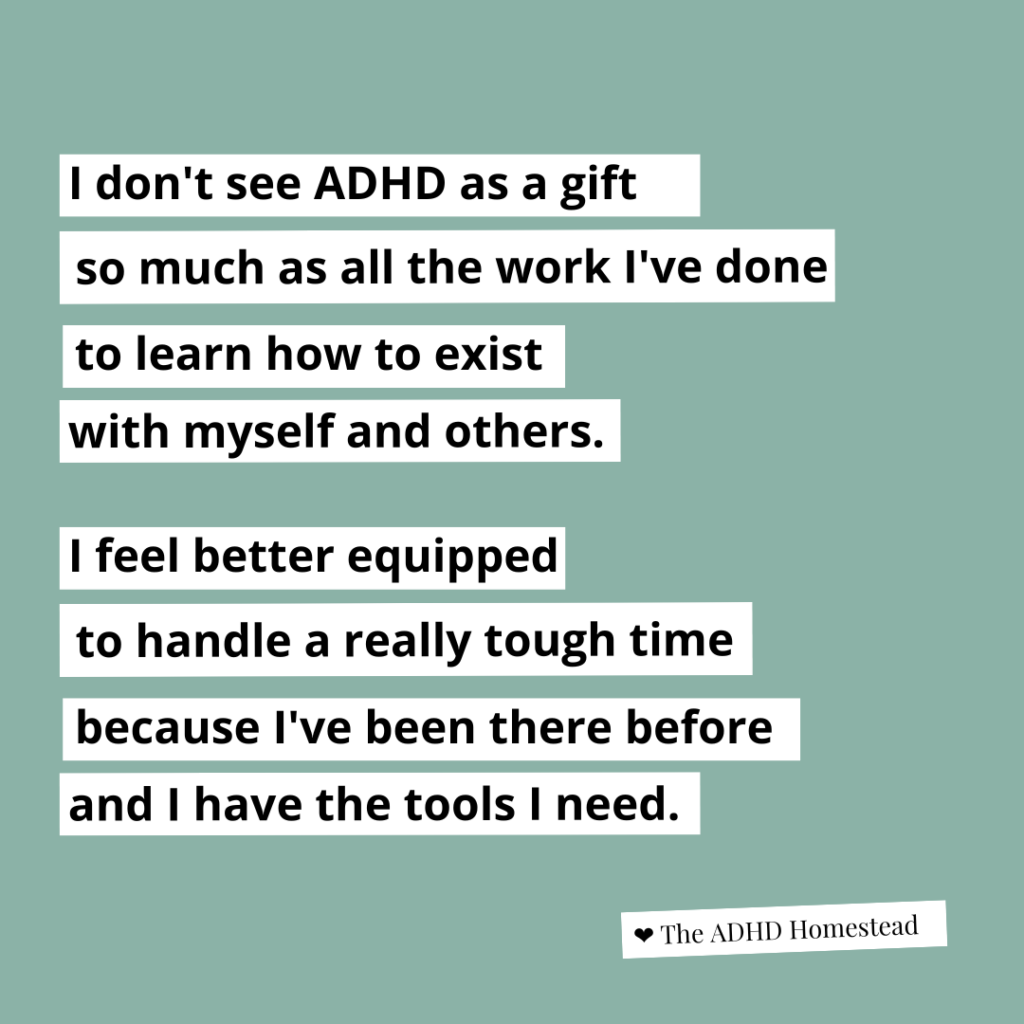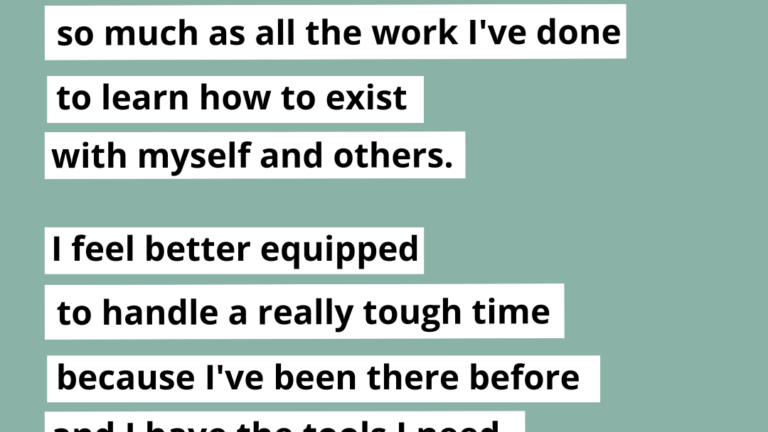In my last post I talked about the perception of ADHDers as naturally good in a crisis. Some people in the community seem to believe this COVID-19 pandemic will be our moment of glory. This belief is misguided — or at least short-sighted. Some of us can and will contribute in ways that draw upon our unique ADHD-ness. However, I expect at least as many others will find this time especially challenging.
My current situation — working from home with more people, more distractions, and less external structure than I’m used to — seems particularly ill-suited to an ADHDer. That said, I’m not drowning yet. In fact, things are going about as well as I could’ve hoped — which is better than expected. ADHD puts me a disadvantage here. In a weird way I think it may also be helping me cope.
Don’t get me wrong: I’m not calling my ADHD a gift or a character strength. It hasn’t bestowed any special talents on me. It’s required me to work harder in every aspect of my life. Ironically, this hardship may have turned into the real gift.
There’s good reason to worry about us
Contrary to what my health insurance and even many doctors would have you believe, ADHD doesn’t magically disappear after our 18th birthday. Problems with emotional regulation, memory, time perception, motivation, and organization can linger for the rest of our lives. Unmanaged ADHD also puts adults at higher risk for divorce, addiction, self-harm, and abuse (both as victim and perpetrator).
Advocates have sounded the alarm about increased danger for abuse victims during this lockdown. I worry about us ADHDers. Emotional volatility and hyperfocus certainly make us seem more vulnerable right now.
Then we have the working memory struggles and increased kin-keeping stress I mentioned in my last post. It’s a lot to deal with.
And yet, we’re feeling weirdly normal
Despite all that, our household is doing surprisingly okay. We’ve argued plenty, but no more — and no more seriously — than usual. My relationship with my husband hasn’t changed. We’ve continued to handle logistics, household chores, scheduling, and conflict resolution with relatively little stress.
And we may have our ADHD to thank — but not for the reasons you’d expect.
We’ve spent years on this project
Unmanaged ADHD wreaked havoc on the early years of our marriage. Had we not pursued knowledge and treatment, it might’ve ended things. Our journey began when we read Gina Pera’s Is It You, Me, or Adult A.D.D.?. We made one unexpected connection after another, astounded at how many seemingly-unrelated issues traced back to ADHD. We found medications that helped us regulate hurtful behaviors and roller-coaster emotions. After several books and a lot of trial and error, we learned better ways to live together.
In other words, ADHD gave us a mental template for things getting tough. We didn’t fall into a natural rhythm; we had to learn it intentionally. I suspect many couples let their relationships run on autopilot — and get away with it — until something pulls the rug out. Then they lack a foundation on which to build an understanding.
Compare that to a marriage between two ADHDers. We’ve had to learn about how brains work to make our marriage work. We’ve read books about willpower, negotiation, cognitive biases, child development and discipline, and yes, ADHD. This gives us a big toolbox to pull out when we get overwhelmed. Even something as simple as knowing a person can’t access their rational brain — or understand your logical argument — when they’re upset is a huge help.
We’ve also learned intentional strategies to help our kiddo with his behavior. This pandemic is a rough patch for a lot of families. Most of 2018 and 2019 were a rough patch for ours, and we worked hard to get to a better place. We learned new disciplinary strategies and had a ton of success with our token economy. Once again, ADHD forced us to build up a big toolbox. That toolbox is supporting us through the pandemic just as it’s supported us through past challenges.
Per usual, it’s not all sunshine and rainbows
As I write this, we’re in our third week of near-total quarantine. I don’t want anyone to get the wrong idea. It’s not easy, and our home doesn’t look like a Norman Rockwell painting.
Last night things started coming apart at the seams. The morning had started off on the wrong foot, with everyone yelling at each other before breakfast. Then I had an unproductive day. My kid suddenly decided he felt entitled to play video games during the work/school day — and interrupt me frequently with requests to do so. My husband had stayed up working until 3:30 a.m., despite my attempts to enforce normal hours. At least two members of our household had our feelings turned up to 11.
Perhaps worst of all, I somehow convinced myself I’d salvage my feelings about the day by doing a few quick things in the office after dinner. Obviously this didn’t work. It never works, and it wasn’t going to start working on a night when I was frustrated, overwhelmed, and getting dinner on the table late. As that reality settled in, I started to lose hope for everything.
Miraculously, I turned things around at dinner. Our family discussed the challenges of the day and what we could do better tomorrow. I instituted a new token economy goal to remind my kiddo to give the grown-ups peace and quiet while we prepared our breakfast and coffee. Rather than rant and rave at a seven-year-old for having too little consideration and empathy for our situation, I talked to him about how everyone’s brains need something different to work properly, and it seemed like none of us were getting all of what we needed during the day. We agreed to help each other meet those needs a little better.
Problem-solving is the name of our game
Our biggest lesson — and one I return to throughout my book Order from Chaos — has been the importance of a troubleshooting, or problem-solving, approach to this everyday strife.
If ADHD isn’t a character flaw, then neither are the challenges it throws in our way. This includes behaviors many people attribute to character. For example: unwillingness to contribute to unpleasant chores, disregard for others’ boundaries and needs, or refusal to compromise or make personal sacrifices. These foibles become all the more frustrating under quarantine, but they still don’t make us bad people.
Last night’s response to a tough day — where I somehow summoned a pragmatic approach despite wanting to scream at my family, then go hide in my bedroom closet — was one I learned from managing my ADHD. I know my family isn’t trying to make things difficult. We love and respect one another and want to make each other’s lives easier, even when our actions imply the opposite. Maintaining that belief requires incredible faith built on knowledge and trust. This takes years to accumulate. I didn’t know I’d need it now. None of us did. But this is also far from the first time I’ve needed it.

ADHD isn’t the gift — the work I’ve done to manage it is
I’m incredibly thankful for that perspective. I’m glad I can land, at the end of a hard day, on the idea that our brains aren’t getting what they need. It would’ve been easier to assume my family is just the worst and I’ve failed as a parent.
And I’ve definitely been there, too. Much of my adult life has been a test. I haven’t always passed.
Back in January when life still felt normal, a radio interviewer asked me how I juggle all the systems I use to keep my life in order. It seems like a lot of work — and it is. I answered that I only do as much as I have to. Success at basic life requires more work for me than it does for most people. Sometimes that feels like a burden. Right now it doesn’t. Right now it feels like all the hardship I’ve faced in my life has equipped me to handle this with a surprising amount of grace.
I don’t take pride in my ADHD, but I damn sure take pride in the work I’ve done to thrive with it. For the time being, that work seems to be paying unexpected dividends. I’ll take those too.
Hey there! Are you enjoying The ADHD Homestead?
Here's the thing: I don't like ads. I don't want to sell your attention to an advertising service run by the world's biggest data mining company. I also value my integrity and my readers' trust above all, which means I accept very few sponsorships/partnerships.
So I'm asking for your support directly. For the cost of one cup of coffee, you can help keep this site unbiased and ad-free.
Below you will find two buttons. The first lets you join our crew of Patreon pals and pledge monthly support for my work. Patrons also have access to my Audioblogs podcast. The second takes you to a simple donation page to pledge one-time or recurring support for The ADHD Homestead, no frills, no strings. Do whichever feels best for you!

